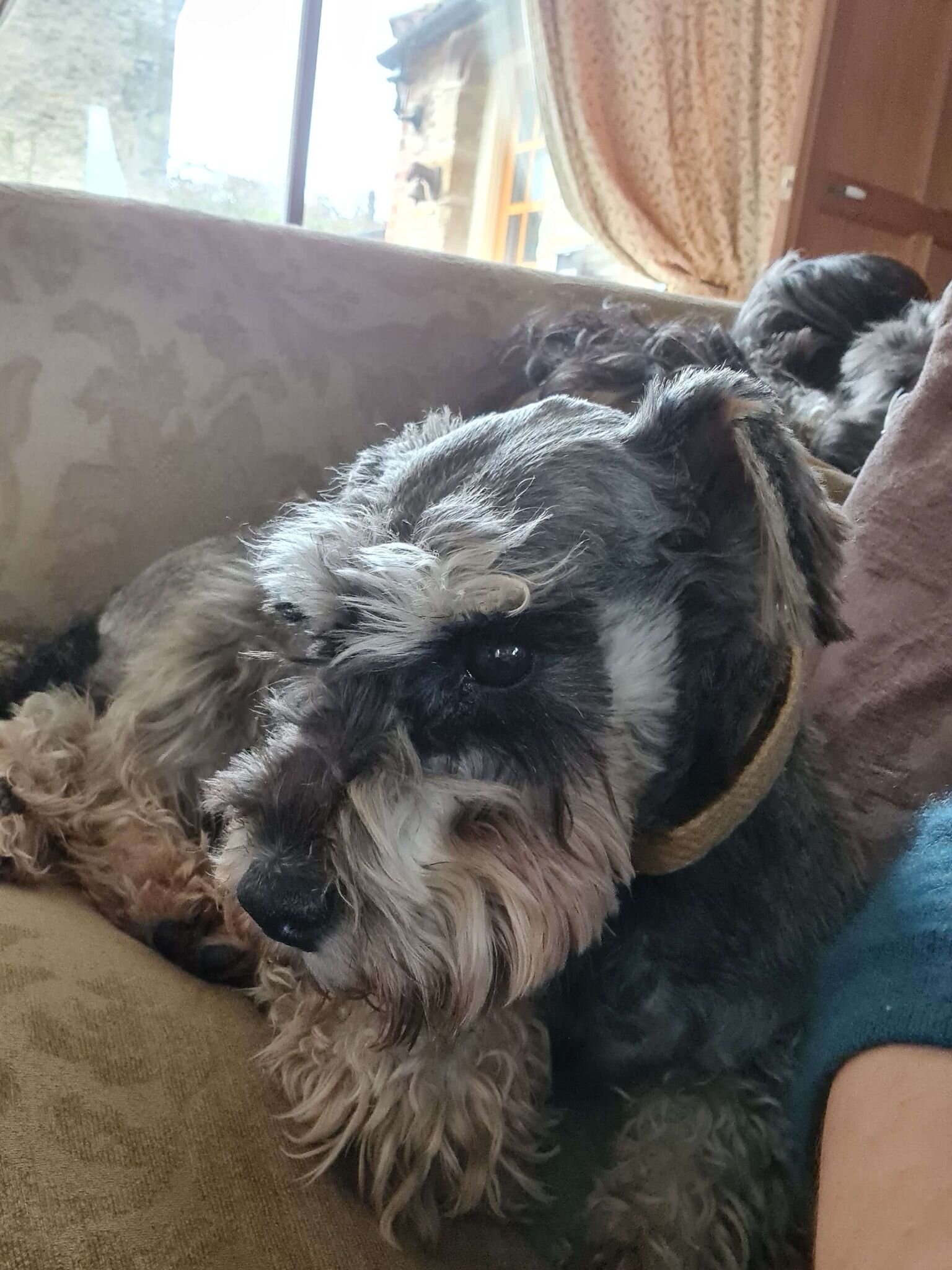At the turn of the new year, the rescuers of Friends of Animals Wales took into their care a 5 year old miniature schnauzer whose life was about to change for the better.
Named Mungo by his adopters (Sean while in foster care), this traumatised dog has spent his life in a puppy farm. The experience will take time for him to recover from. While male dogs don’t have the endless demands of repeated pregnancies that females endure in puppy farms, their lives are just as miserable. Isolation, loneliness, neglect, everything is as bad for the boys as it is for the girls. Hormone driven fights are common. It’s a dreadful experience for a dog to recover from.
Mungo began his recovery and journey to becoming a loved family member by joining his foster home and visiting the vet. The dental involved removal of 33 teeth, which although shocking to know, will mean he is much more comfortable without a mouth full of rotten teeth.
Mungo is traumatised, shut down and finding adjsting to his new, good and caring world hard, but he will get there. His life is his now.
Schnauzerfest is supporting his rescue with the financial costs of all his veterinary needs whilst in foster care.
APRIL 2021
It’s now been a few weeks since Mungo began the chapter of his life that he has been waiting 5 long years for. Life as a cherished family member, not part of a puppy farmer’s stock.
He has settled into his new life with courage. It is not easy for a dog whose life is upended, even when we know it’s for the best, they just don’t. Adjusting to new routines has taken time for Mungo and what can seem perfectly normal things to do, have proved to be small challenges. For example, he couldn’t eat from a regular dog bowl and it took his family a little while to realise that it was the bowl not the food that was challenging for him. In puppy farms it’s not unusual for food to be thrown into a pen, for dogs to have to eat from the floor, or scramble - or fight - to get scraps from overturned, dirty dishes. Replacing the bowl with a plate moved Mungo over that hurdle.
Mungo’s adopters are highly tuned to his sensitivities and aware that his background will throw up challenges for some time to come. When his rescue, Friends of Animals Wales chose them as Mungo’s new family they picked well. Taking a read of this blog, written by Mungo’s adoptive mum, shows how intuitively his needs will be met.
With his two canine sisters and human family helping him along, Mungo has a bright future now. He also has wisdom to share, taken from the link above:
Mungo's Teachings:
Listen carefully and compassionately to others... that way you can pick up the needs behind the behaviours, even when the behaviours look unuseful.
Don't become a victim of your story... change is always possible.
Treat one another with kindness, patience, respect and love, because in the end we are all connected.
SEPTEMBER 2021
Joanna, Mungo’s adopter has been keeping a journal of Mungo’s life with them. It’s helped her to identify the many small, but cummulative changes he’s going through during his recovery from a life of trauma. The breeding industry causes great harm to dogs and adopting a survivor involves uncertainty for both the dogs and humans. The shared journey is rewarding but not without challenge.
“When he first arrived he wouldn’t go out into the garden or come back in again without being carried, which he didn’t like. He spent his evenings just standing with his head down, we called it his “Eyeore” pose.
The tiled floors in the kitchen and the hallway were impossible for him to cross, we likened his reaction to seeing lava ahead and we had to put down towels and rugs for him to walk on.”
Joanna has kindly provided excerpts from her journal which illustrate how Mungo is learning to settle into homelife.
1 March: his tail was starting to stay up more in the house, and he decided that the hallway was not lava. He still had issues with the majority of the kitchen though.
5 March: Mungo barked for the first time; a little hoarse, rusty bark. He was now sleeping downstairs by himself. He would try to play with the girls, but didn't yet know the rules.
12 March: he rolled onto his side when I was tickling him, allowing me to stroke his belly.
17 March: the hallway floor becomes lava again, just for a couple of days.
19 March: he came over and approached me for tickles, and sat down (previously he’d stayed standing).
26 March: the first evening spent on the sofa with us although we had to lift him up, but he did allow it and stayed.
2 April: he climbed up the stairs for the first time.
9 April: lifted him onto the bed for the first time when he barked at 6:00 AM. He loved the bed - lots of sniffing and chewy hands.
15 April: he jumped up with pleasure at me for the first time.
17 April: stressed after yesterday's long walk, halfway around the Schnauzerfest circuit (about 3 miles) – upset tummy again.
19 April: first visit at home from other dogs - very happy to play. He is very interested in people and dogs on our walks, although he is nervous when people say hello.
24 April: went down the stairs for the first time.
1 May: began spending evenings upstairs on his own, under the bed in our bedroom, now he has mastered the stairs.
31 May: began to accept bits of chicken from John’s hand. He’s now in a morning routine of waking around 6:00 AM and asking to be lifted onto the bed for an upside down roll, and a game of bitey hands. Sometimes he settles back to sleep.
5 July: he went through the ‘kissing gate’ for the first time, without having to be carried.
20 August: he's now been with us for six months. A change of diet has put a stop to the digestive issues, and his coat has radically improved. He's also changed shape! Much more muscle now, and looking fit. Our walks are still stop- start - I must keep scratching his head, or giving him a pat, to reassure him, then he starts again. Now spending part of every evening on the sofa with us, less ‘alone time’ upstairs.
10 September: he seems to have regressed back to spending every evening upstairs again. He seems perfectly happy in himself. He is very happy to see us when we go upstairs, and comes back downstairs if he hears Luna barking, and then goes back upstairs again. He likes his autonomy. He still avoids walking on one side of the island unit in the kitchen, or across to the dining area. Mungo’s hobbies are eating, barking at delivery people and sleeping – a typical schnauzer! Luna, in particular, loves him and will curl up in bed with him, and lick him…a lot!
Much of what Joanna shares is typical for breeding dogs - and their adopters - learning to adjust to living for the first time outside of the small confined space that has been all they’ve known their entire lives. It takes some dogs years to adjust, while for others the process is quicker, or less difficult. Each dog is unique, each life they lead is individual. Adopters should be prepared to accept their dog is unlikely to be what might be assumed a ‘normal’ dog. They will however be very special.






